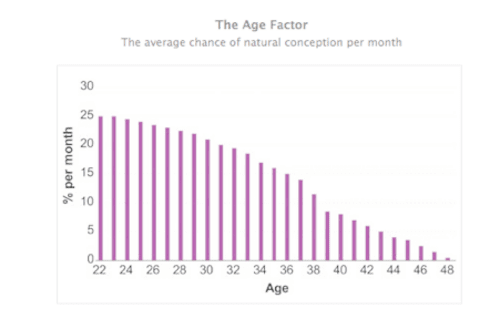Age & Fertility
As a woman gets older, she produces fewer healthy eggs. This decrease in egg production gets faster with each year.
That’s why the major cause of fertility problems in women is their age. Once you turn 36, your chance of conceiving naturally is about half of what it was when you were 20. By the time you are 41, this chance falls to just 4%.
Why is age such an important factor for women?
There are two important ways that ageing affects a woman’s chance of conception: the quantity and the quality of her eggs.
1. Quantity: A woman is born with a fixed number of eggs from birth. In fact, the peak number of eggs is actually when she is in her mother’s womb! There are 7 million eggs at seven weeks gestation, but when a woman is born, that number drops to 2 million. Then, from the time she is born to when she begins to ovulate and gets her first period, the number of eggs left in the ovaries is about 250,000.
Even though women only ovulate one egg every month, they are still losing a few hundred eggs each month. This process continues until menopause, which is when periods stop, and this usually occurs at the average age of 51 – at this point, there are no more eggs left in the ovaries.
2. Quality: Not only does age impact the quantity of eggs, it also affects the quality of those eggs. After the age of 35, the quality of a woman’s eggs start to decrease, with higher chance of genetic abnormalities.
So, if you are over 35 and having trouble conceiving naturally, it’s important to seek medical advice within 6 months. If you are under 35, we generally advise you to wait 12 months, but it’s important to be proactive so see a specialist sooner rather than later. In addition, if you have any known conditions such as a history of STD's or male factor issues, then don't delay in seeking specialist help.
Your first step is to discuss these issues with your GP, as they can help you with ways to maximise your chances of conceiving naturally and begin any fertility investigation. They can then refer you to a fertility specialist of your choice if required.
